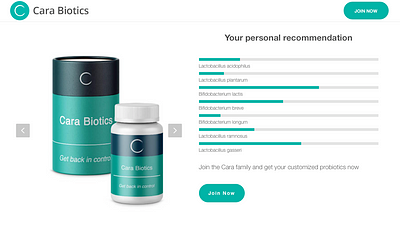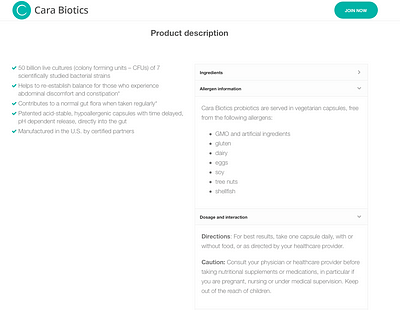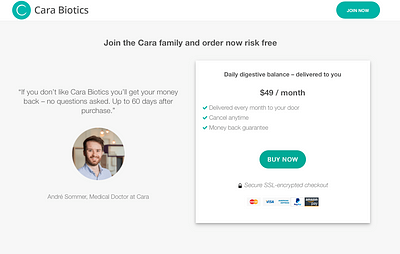Cara is „Your personal food and symptom diary“ with which you can track your stool’s condition, your digestion, mental situation and the food you consume. Based on this information the app provides you recommendations on how to adapt your lifestyle and offers you tailor-made medicine called „Cara Biotics“ against your gut issues. Recently, the company behind the app received a two million dollar investment (link in German).
This means that Cara operates in three markets:
- AI-based drug discovery
- Health tracking: stool’s condition, you digestion, mental situation and the food you consume
- Health treatment: recommendations and Cara Biotics
Let’s first examine health tracking and treatment.
Health tracking
For this use case, the Cara app is simply a diary. There are two issues with that.
Firstly, switching costs. Users can extremely easy switch between other apps especially as Cara allows you to export your data. However, data is what could lock people into the app, provided that they allocate enough of it. And this is the second issue; habitual usage. For Cara to be of real value users must use it frequently. Convincing people to use it regularly will be very difficult but not impossible.The Hook Model offers an interesting insight into that. It explains that you need an internal trigger to start the app, you then have to do a certain action, you must be rewarded and you must increase the app’s value through investing in it. For Cara, the trigger would be some gut-related issues (e. g. feeling bloated), the action would be entering information into the app (the issue is here that it is not as smooth as, for instance, checking a news feed.), for the reward phase Cara uses gamification (the trouble I see here is that this reward is delayed) and the investment-phase comes through entering your information into the app. Whereas in theory it works, in practice I think that people will quickly be annoyed by pulling out their phone each time they eat something or feel bad.
Market size
The Co-Founder Jesaja Brinkmanns categorizes Cara as PoopTech company and claims that PoopTech is “the next big thing“ (this a bold statement especially when you consider that people named things like AI, AR or CRISPR the next big thing). He backs this statement up by arguing that between 15 and 20 per cent of the population suffers from gut -related issues like flatulence, stomach ache oder diarrhea. Although he does not specify which population I am assuming, based on another source which reports 17%, that he refers to the German population. These 17% or 14 million people, however, refer only to reported cases (people who go and see a PHD). This in turns implies that there are unreported cases of people who do not want to go to the doctor or do not know about the condition, for instance. This is interesting because Cara could not only support the former group (those who go to the doctor) but also those unreported cases.
According to CB Insights the PoopTech industry contains companies dealing with the lifecycle of human fecal beginning with how we digest food and ending with how we dispose of it and what happens in our stomach with it. In 2017 a total of 41 companies raised $690M. The subindustry Cara is in, healthcare, alone has raised some $100. Cara, not included in this sum, equals then two percent of this. Although this is not much, it is still more than the $1,4 Asana Medical (third in that category). Some of these companies are B2B and conglomerates as opposed to Cara which is B2C and a start-up. Also, Cara is an app and the company behind it is — in contrast to the other companies in that category — more a technology company than pharmaceutical one. However, there are several companies working AR-based drug delivery. Although Cara is not creating drugs themselves, both these sectors’ success depends on the same thing, namely whether they can manufacture useful tailored drugs. Cara’s advantage is that they have immediate — although not perfectly accurate — customer feedback.
The above-mentioned habit-issue, however, must be seen in the context of the market of 14 million people. Wherease 14 million people might indeed suffer from such issues, the amount of people suffering from it and willing to invest time into tracking their problems through an app is lower. For simplicity’s sake lets assume that the number of unreported cases Cara could additionally target and the amount of people they use due to this habit-issue cancel each other out.
Additionally, however, I have to question (admittedly as a medical laymen), the usefulness of some tracking parameters in the context of market size. For instance, workout, sleep or pain. Whereas such parameters influence your gut, I am unsure for how many of these 14 million this information would lead to better medication. It is a classical Pareto principle; There are, of course, people whose problems are caused by these factors but I think that it is really a fraction and for the vast majority (Pareto’s 80%), the major parameters (food or digestion-related questions, Pareto’s 20%) are enough. Therefore, it might not even make sense to implement such parameters.
Nevertheless, sticking with these 14 million people, a market share of 20%, average treatment duration of six months and immediate healing effects after six months we are looking at potential revenues of about 1 billion.

However, Cara has something of a Catch-22 problem. If the probiotics are not making you feel better, you will stop using them. However, if they are making you feel better, you will also stop using them, because, if you feel better, you do not need them anymore. And whereas this logic would apply that eventually they would run out of customers to serve, I doubt that deeply because it will need far more sophisticated technology to alter our eating patterns once and for all in such a way that we would never have gut issues again.
Health tracking and the creation of a personal electronic health record
On a very basic level this tracking functionality is interesting for the creation of an electronic health record. Information about nutrition, stress etc. can, through the integration into Apple Health be used for other applications, the creation of other drugs and helps creating a comprehensive health overview about yourself. Due to the type of input (e. g. subjective rankings) the practical use of this is limited. But more about this later.
Health treatment: recommendations and Cara Biotics
For this use case the app offers two solutions. Firstly, in-app recommendations on how you can adjust your behavior (e. g. eating) to feel better and secondly, tailor-made drugs. First let’s look at the in-app recommendations.
In-app recommendations
These recommendations such as recipes are based on the data you feed the app with (what you eat, how stressed you feel, how you stool was…). However, I am bothered by the lack of precision and depth.
With depth I am questioning whether they collect enough information due to people not using it regularly (see the „habit problem“ I have mentioned above.). Feeding the Cara app with data is very analogous. Whereas startups like Kiweno analyse blood, Cara uses scales, numbers and so on for tracking. Through that the information entered is very subjective and depends on the user’s mood, available time or simply her ability. Thus, making the data very imprecise.
In essence the question is whether analogous data input can provide enough information for useful recommendations. This question is one of the cornerstones upon which Cara’s success depends, especially in the context of Cara Biotics, the company’s tailor-made drugs.
Cara Biotics: tailor-made drugs against gut-issues
The other thing Cara offers is Cara Biotics. These are probiotics tailored to you based on the data from the app. Cara offers these probiotics as a subscription for $50 a month. From this perspective Cara is terribly interesting. You track your living behavior (nutrition, mental state etc.), get a set of tailored drugs, track how your gut reacts and get a refined set of drugs based on these inputs. It is highly repetitive and narrow version of the typical drug development process. For consumers this means that they get tailor made treatment, for Cara this means that they collect a lot of information that would be of interest to a range of companies. However, similar to the case with in-app recommendations, the drug-outcome-feedback loop can also become victim of ambiguity. Without direct measurement of the drug’s reactions on the stomach (as it would be possible through „Ingestible“ such as Proteus which are drugs equipped with sensors that measure their reactions on the stomach) I have to question whether the drugs’ effect could precisely be isolated from other influences such as stress or food. Also, users will have problems diagnosing themselves. A doctor can ask clarifying question if you description is too vague, an app cannot do that (yet). Furthermore, this self-diagnosis actually shifts work (checking symptoms) from your PHD to you and this is never good.
Danger of forward interation
These tailored drugs, however, are not made by Cara but by a third party. Cara only provides the formula for the drug manufacturing. It would be interesting to know who that supplier is and how much of that formula the supplier knows because on this it depends how likely the supplier is to integrate forward or collaborate with Cara competitors. Here, Cara’s export functionality is putting them in a weak spot because if you can export the data and a third party is manufacturing the drugs, consumers have less switching costs.
Danger of little to no use in tailor-made drugs
What bothers me further is, from a medical laymen perspective, how much you can actually refine such a drugs. My hypothesis here is that for a majority of the 14 million people Cara wants to target a normal „off the shelf“ drug would be enough.
Danger due to brand reputation and trust
In this context, one also has to question Cara’s reputation compared to drugs coming from a pharmacy. For many people health is a delicate topic and they would only consume medicine endorsed by a pharmacist or PHD. Buying Cara Biotics looks and feels more like buying groceries than medicine (compare the screenshots from purchasing Cara Biotics and drugs from healthwarehouse and shop-apotheke, both online pharmacies).
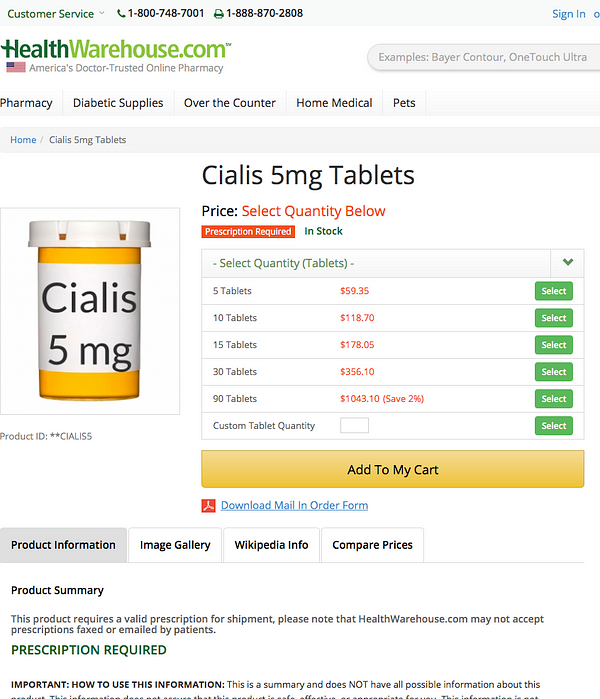
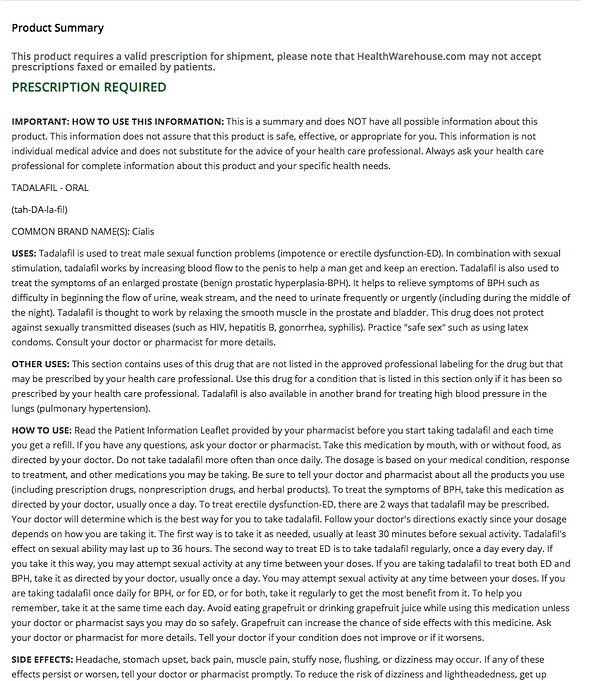
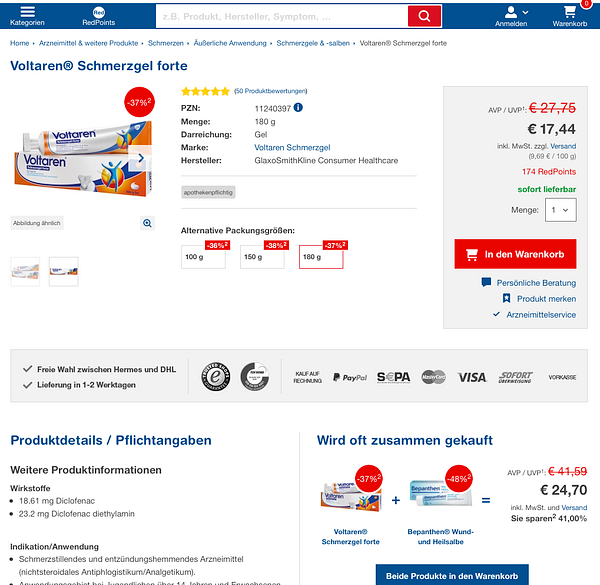
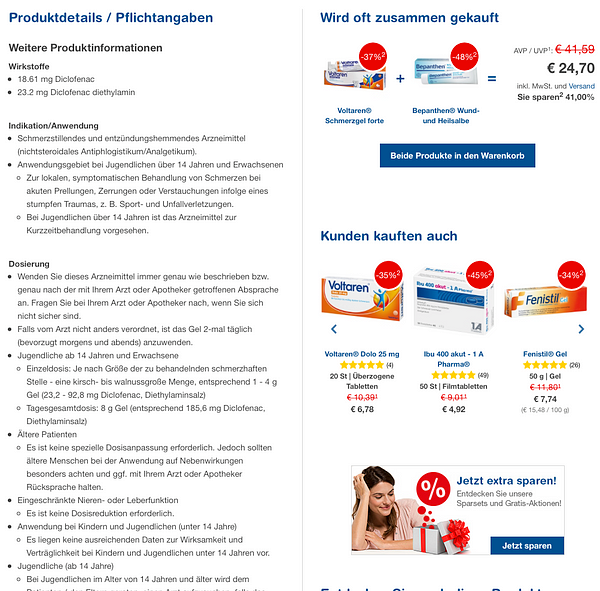
Cara Biotics looks nicer, no doubt, but — at least to me — the two only pharmacies look more trustworthy. I for one would only buy from Cara Biotics after an endorsement by a PHD or pharmacist I know. And I think this is the case for many other people. Moreover, Cara’s direct sale channel is another source of distrust for me. Whereas there is certainly a lot of lobbying in regards to a pharmacy’s offering, they are still less biased about medicine than the company selling them (i. e. Cara in this case).
Furthermore, the question is why people would trust Cara for a recommendation in the first place instead of a pharmacist or similar. The answer to this question lies in a paradigm shift, starting with the digitalization of the whole customer job.
Digitalization of the customer job
Right now customers have to carry analogy documents from and to their PHDs, they have evaluate which medicine to take and how. According to CREATIVE CONSTRUCTION, every 20 to 30 minutes one person dies due to wrong medicine intake (wrong doses, wrongly prescribed or bought without consultation). Cara digitalizes the whole customer job of getting a treatment and even eliminates the doctor.
With Cara you keep a digital track record, do not have to worry about which medicine to take, when, how or how much of it, and if you do everything through the app, it eliminates your doctor completely.
What this comes down to is that one must not compare Cara — as I have done — too closely to the old technology (pharmacies or PHDs).On a very broad level it is similar to when the first telephone came out and people argued that they would rather talk in person. Or how people were claiming that fashion or groceries cannot be sold online (I still dislike online cloth shoppoing though). Cara is embracing a new paradigm in medicine; tailor-made treatments and doctor-free diagnosis. A paradigm that makes a lot of sense, but where the execution is very important and, of course, difficult. For Cara this means that the app has to be very „Hooking“, their drug-discovery formula must be proprietary to them, forward integration has to be prevented as much as possible, and that they should diversify into other drugs (with the same approach; tailor-made drugs and doctor-free diagnosis) and more precise tracking (blood analysis, wearables…). I really love the concept and hope to see more such apps for other diseases. Gut issues as a market seems too small too me and I am under the impression that people just do not care about it that much even if they are affected. Admittedly, this might be a perception issue from my side as — according to the co-founder — gut-related issues are still a taboo topic.
All the best to Cara!
